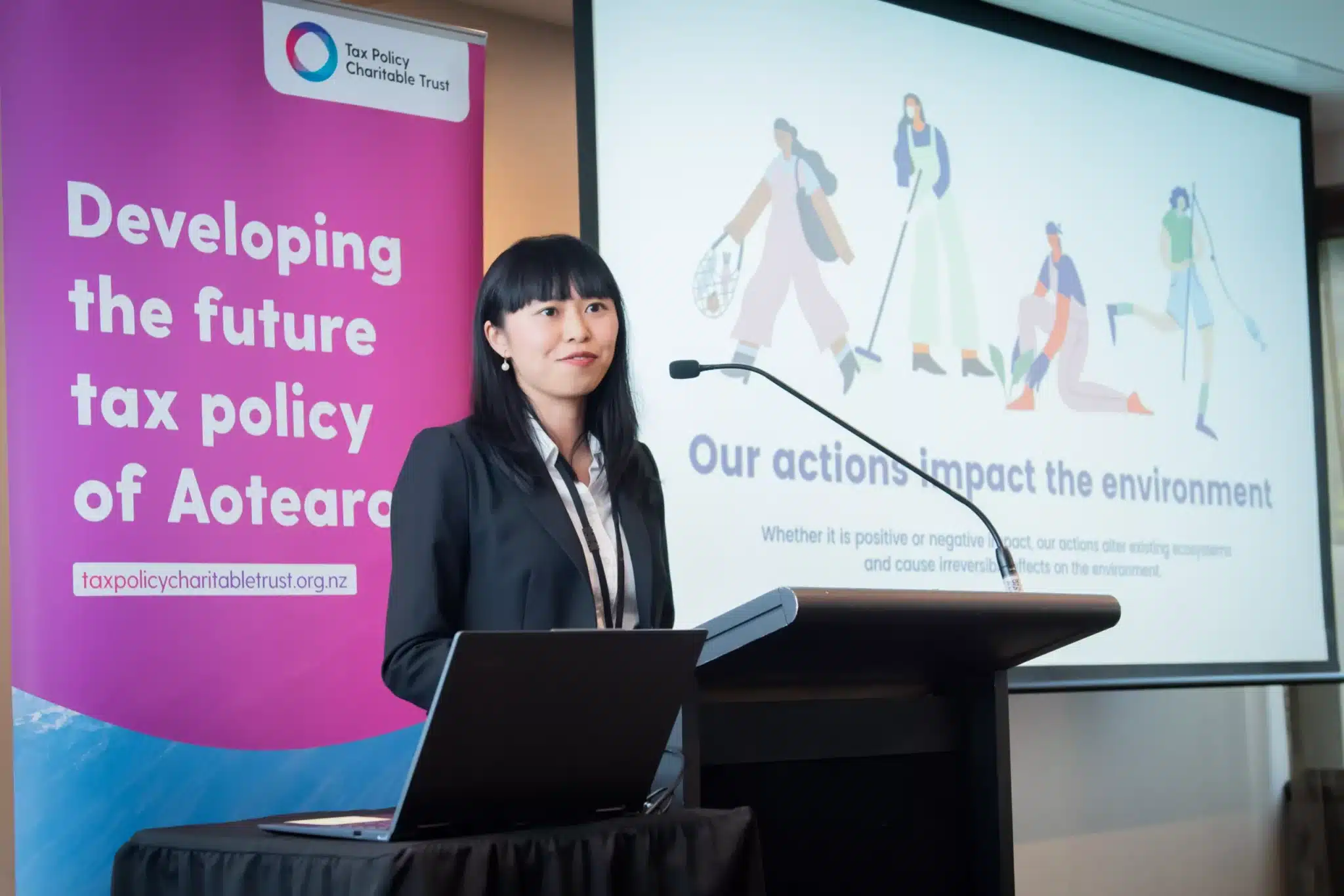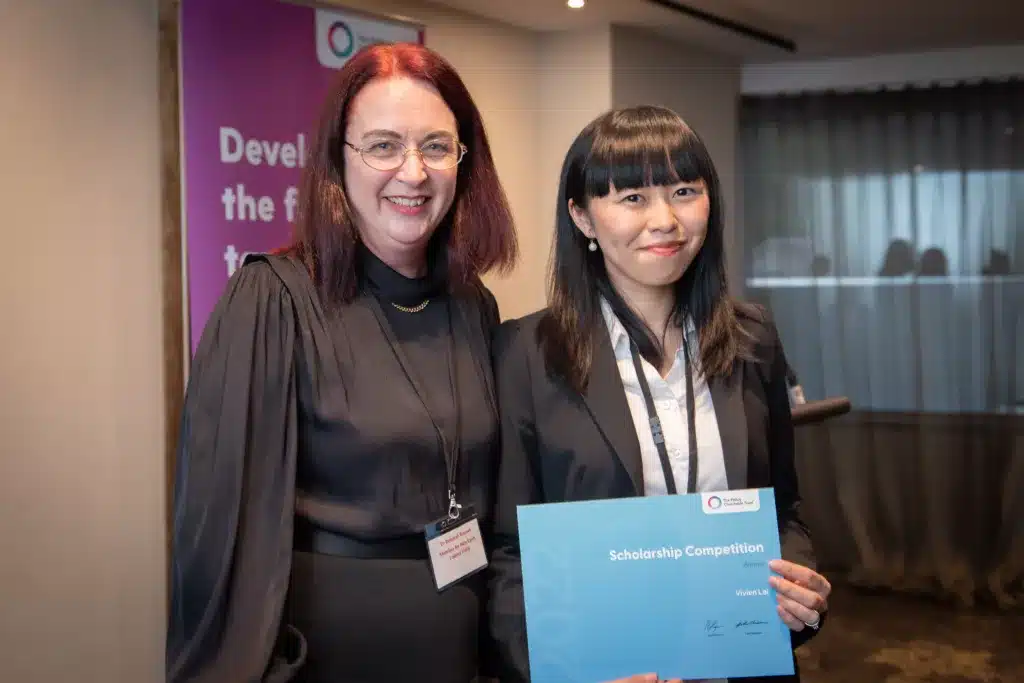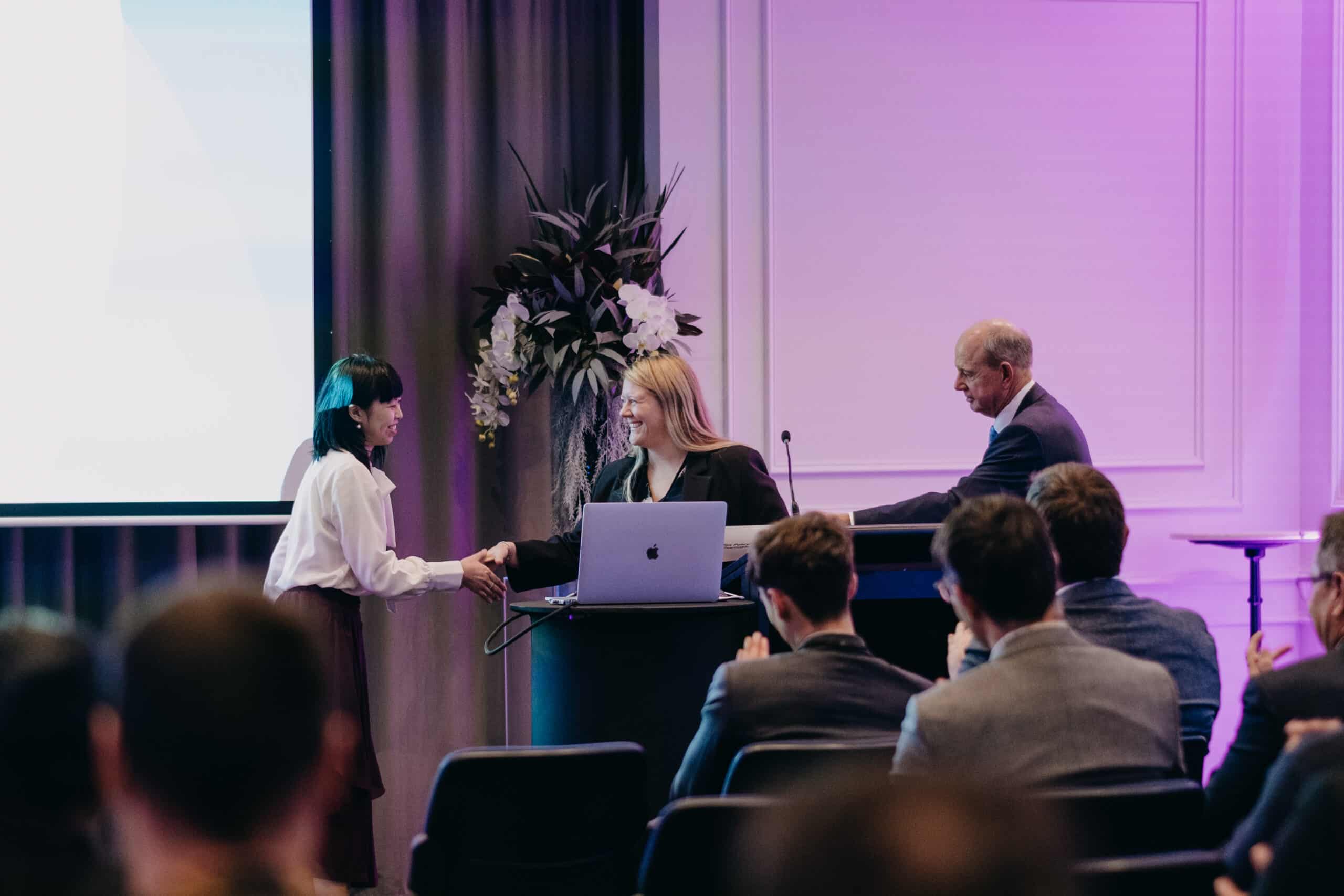Inspirational idea wins Tax Policy Scholarship Competition
A game-changing idea to fight climate change won this year’s Tax Policy Charitable Trust Scholarship.
Each year, the Tax Policy Charitable Trust (supported by TMNZ) awards a scholarship to celebrate the brightest young minds in the industry, and 2022’s submissions were as inspirational as ever.
Entrants were invited to submit ideas that could transform New Zealand’s tax landscape, looking at either environmental taxation, tax administration, or the powers granted to the Commissioner of Inland Revenue to collect information.
The competition, open to people aged 35 and under, generated progressive and innovative ideas from the industry’s young leaders. In the end, one entrant was selected as this year’s winner for her outstanding approach to New Zealand’s tax and environmental challenges.
And the winner is....
Vivien Lei, Group Tax Advisor at Fisher & Paykel Healthcare, won this year’s scholarship for her submission to introduce Impact Weighted Taxation in New Zealand, an innovative idea that would see businesses pay taxes based on their environmental impact.
A panel of leading industry professionals judged Lei’s proposal as the winner among a strong field of candidates. Mitchell Fraser, Daniel Doughty, and Jordan Yates were also celebrated as finalists in the competition.
Lei was crowned the winner at the Tax Policy Charitable Trust’s finals evening on October 19, after each finalist presented their idea to an audience of industry professionals.
Trust Chair John Shewan said the judges were “delighted to see passion and energy behind the submissions and supporting presentations”.
Lei, who received a $10,000 cash prize, described the competition as “an amazing experience”.
“You don't often get many opportunities to think creatively about tax policy, so this was a nice space to do that,” Lei says. “Being able to develop my policy thinking and talk to some of the leading experts was really great — and winning was a huge surprise!”
This year was Lei’s second attempt to win the scholarship following an earlier submission in 2019. Her perseverance and positive attitude paid off.
“I entered when I was still very green in my career,” she says. “Since then, I’ve been mentored by amazing people who have helped with my development, particularly Rachael Bull, Head of Tax at Fisher & Paykel Healthcare, and Joseph Chueh who fostered my interest in tax policy. I was grateful to have their support this time around.”
Tax to fight the climate threat
Lei’s background in the social impact sector and personal concerns about the environment informed her submission idea.
“These are the most difficult problems of our time,” she says. “I’m hoping my idea will bring the conversation to the fore and spark other young minds in our industry to think about how tax might influence positive environmental outcomes.”
The Tax Policy Scholarship Competition is proudly supported by TMNZ, which invests 100% of its profits back into the environment and community, through strategic philanthropic partner, Whakatupu Aotearoa Foundation. Lei believes that tax professionals can help to build a better future for Aotearoa.
“It’s scary to think about the trajectory we are on with our natural capital, so it’s important for our industry to think of ways to help,” she adds.
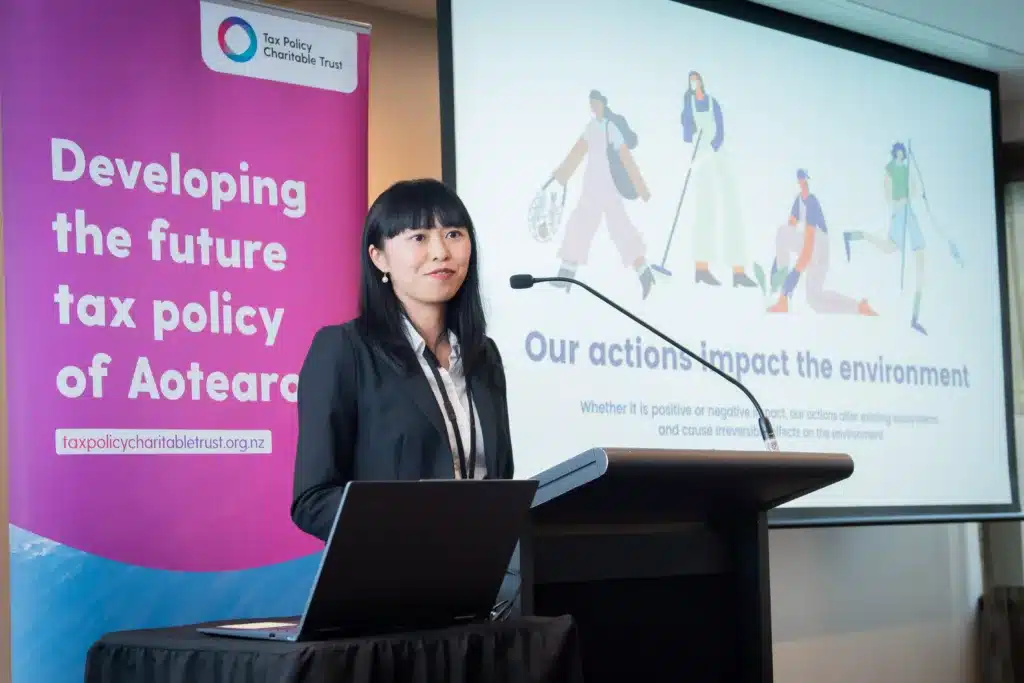
Inspiring future tax leaders
Tax Policy Scholarship Competition Judges commented that this year’s entrants will inspire future generations as well as today’s professionals.
“This competition is all about supporting and inspiring future tax policy leaders. The results from this year and from earlier years’ competitions reflect the presence of emerging talent that will ensure the continuation of leading tax policy research and thinking in New Zealand,” said the judges.
Find out more about the Tax Policy Scholarship Competition here.
Tax Policy Scholarship showcases the next generation of talent
Four bright young industry minds have emerged as finalists in this year’s Tax Policy Scholarship Competition, an annual prize hosted by the Tax Policy Charitable Trust.
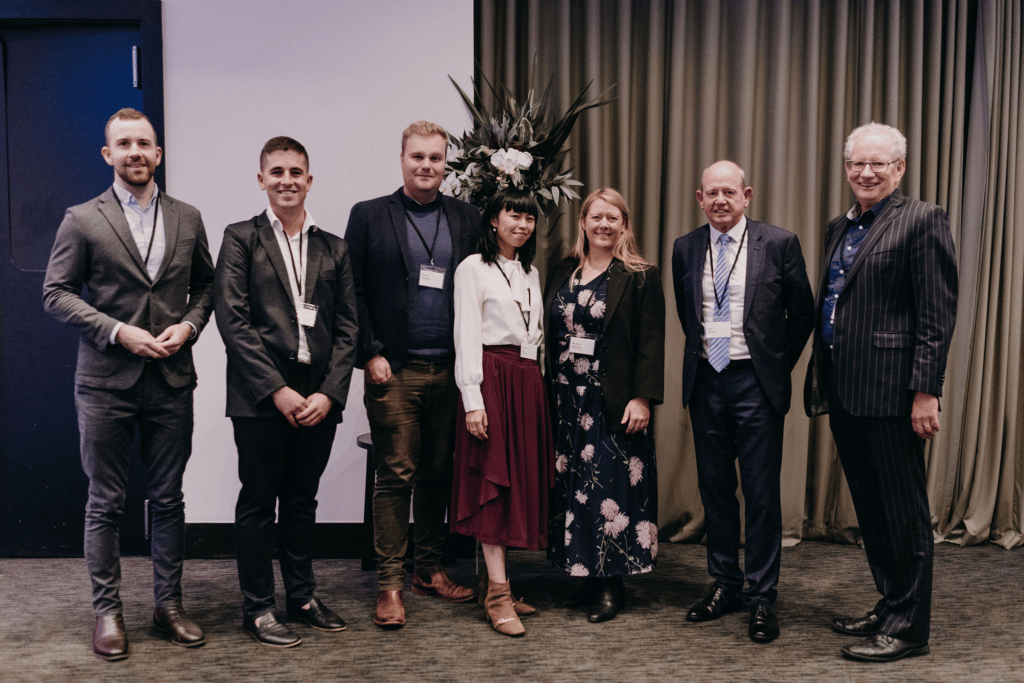
The biannual competition, which supports the continuation of leading tax policy research and thinking in New Zealand, enters its fourth round in 2022. The first competition was run in 2015.
The scholarship is designed to inspire the next generation of tax industry leaders. This year, entrants under the age of 35 were invited to propose significant reforms to our current tax system or analyse potential weaknesses and unintended consequences from existing laws, and propose changes to address them.
Entrants were asked to tackle one of three topics: environmental taxation, tax administration, or the powers granted to the Commissioner of Inland Revenue to collect information for tax policy purposes. Participants were invited to address the topics with creative ideas backed up by reasoned research and analysis.
We are delighted to announce the four finalists for this year’s competition, selected by our panel of leading tax industry professionals.
Daniel Doughty
Daniel is a Senior Consultant with EY in Wellington. He has proposed the introduction of a small business consolidated reporting regime to simplify tax reporting for small companies.
The regime would consolidate pre-existing tax obligations into a single report to be filed every second month. Inland Revenue would send an automated income summary out at the end of the year, similar to those currently prepared for individuals.
Mitchell Fraser
Mitchell is a Tax Solicitor with Mayne Wetherell in Auckland. Mitchell is concerned that the recently-expanded powers granted to Inland Revenue to collect information for tax policy purposes could create unintended consequences.
He believes the new powers risk political interference, conflicting with the IR’s need to be politically neutral. Mitchell proposes identifying alternative means to collect this information, including through Statistics New Zealand.
Vivien Lei
Vivien is Group Tax Advisor with Fisher & Paykel Healthcare, and finance lead with the Fisher & Paykel Healthcare Foundation.
Vivien proposes to change New Zealand’s environmental practices through the introduction of an impact-weighted tax regime. Under this model, organisations would be taxed on their net positive or negative impact on the environment.
Jordan Yates
Jordan is a Senior Tax Consultant with ASB in Auckland.
Jordan believes the tax policy landscape is fractured, and suffocated by political roadblocks. His proposal is to establish an independent statutory authority that would be responsible for the independent management of fiscal policy, as it relates to the tax base.
Selecting a winner
The finalists were announced on 2 June, and each will go on to develop a 4,000-word submission on their proposal.
The four will be invited to present their final proposals and answer questions at a function in October 2022. The winner will be announced that evening.
Our Tax Policy Scholarship Competition celebrates creative thinking from young professionals and also provides a springboard for the brightest industry minds to develop their careers.
Nigel Jemson, the winner of the 2019 competition, says: “Entering the competition was a terrific opportunity for me to grow and develop my tax policy thinking and connect with leading minds in the tax community. Winning the competition has given my career a boost and since, I have enjoyed a range of great roles in tax for leading businesses, Spark and PwC, and continued my involvement in and passion for New Zealand tax policy.”
Chris Cunniffe, Tax Policy Charitable Trust Committee Member and TMNZ Chief Executive, says this year’s entries underline the strength of the next generation.
“We’re consistently delighted with the breadth and the freshness of thinking young people bring to this competition. The competition provides a forum to share ideas, and secondly, ensures that creative tax policy is not the sole domain of people who have worked in the industry for a long time. As an industry, we are open to fresh thinking and new ideas.”
Tax Policy Charitable Trust Chair John Shewan says the entries prove the industry’s future is in good hands.
“New Zealand has been very fortunate to have so many competent tax leaders involved in developing policy for the betterment of our country. It’s very exciting to be around the next generation of future tax policy influencers, who are already, at a young age, focused on innovative opportunities to enhance the tax landscape.”
Michelle Redington, Chief Tax Counsel at Inland Revenue, who was the guest speaker at the event where the four finalists were announced, says it is fantastic to see the Tax Policy Charitable Trust create opportunities for the next wave of tax policy thinkers.
“Throughout my career, I have been very lucky to be supported by some of New Zealand’s preeminent tax leaders, who have been fantastic teachers and mentors,” she says. “I’ve enjoyed a diverse career in tax, spurred on by a need to solve complex problems, and I’m proud to be able to give back to the next generation of talented tax enthusiasts.”
Find out more about the Tax Policy Scholarship Competition, here.
Tax Policy Scholarship Competition finalists
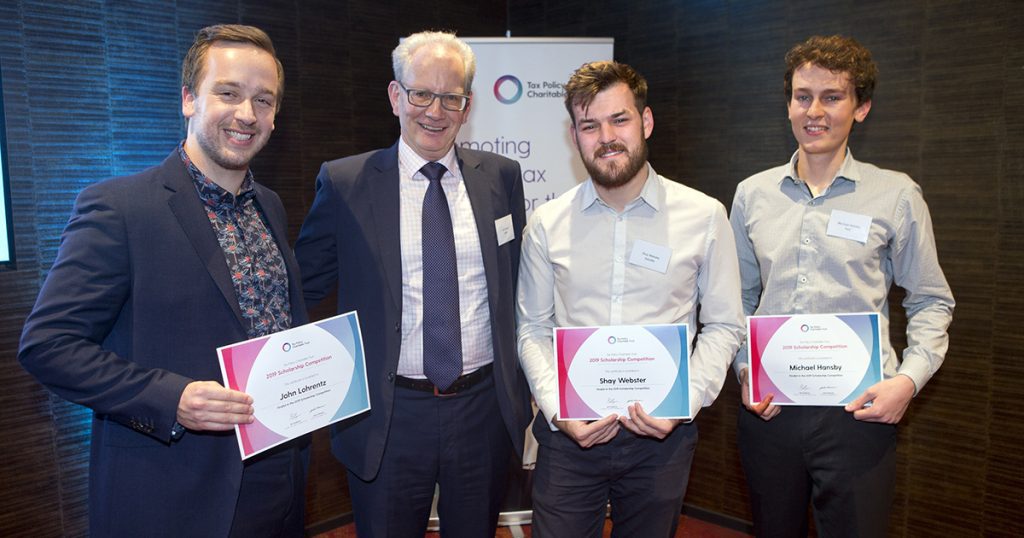
A negative income tax coupled with a flat tax rate for individuals and the creation of a trusted taxpayer regime.
These are among the ideas judges will hear as part of the Tax Policy Scholarship Competition.
A tax on biogenic methane emissions and freshwater as well as reforming the R&D tax credit regime are the others options on the table.
Spark’s Nigel Jemson, and the Deloitte duo of John Lohrentz and Shay Webster are this year’s finalists.
They are vying to win $10,000 prize money.
The three finalists’ proposals are an interesting mix of environmental, social assistance and behavioural messages, says Tax Policy Scholarship Competition judge and Tax Policy Charitable Trust chair John Shewan.
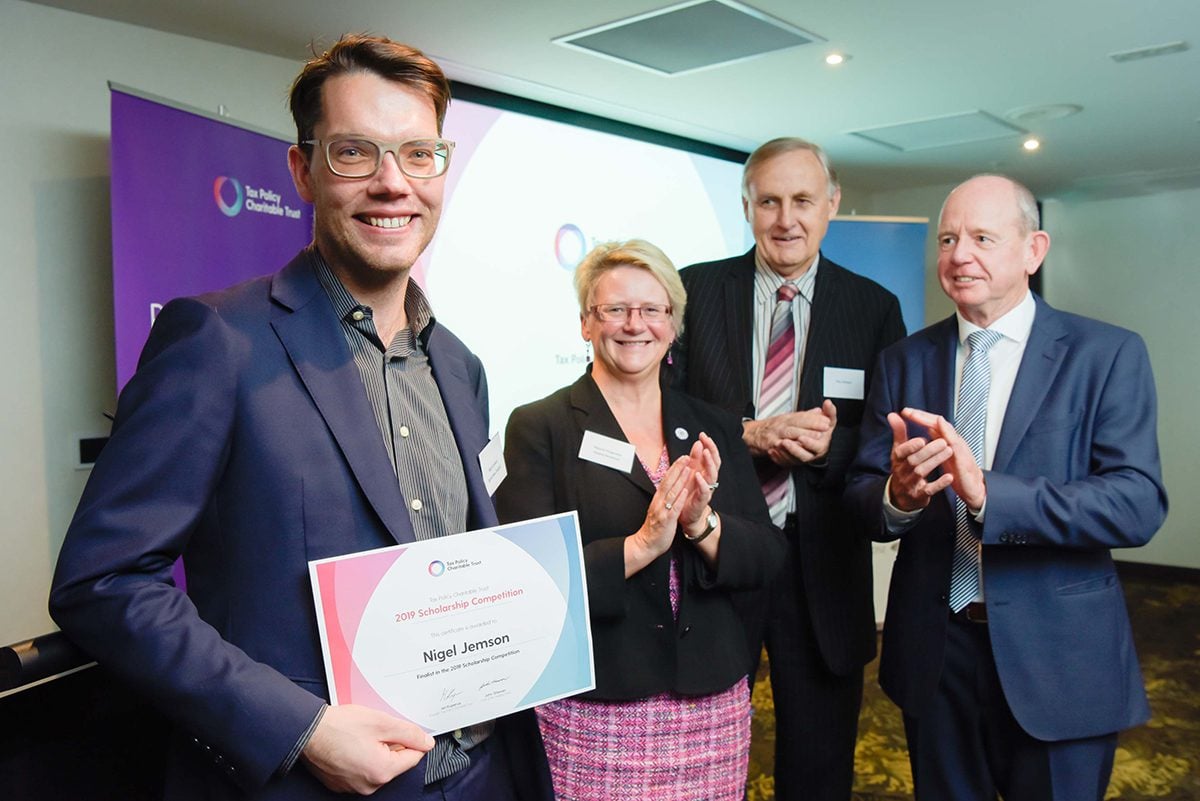
The ideas of the quartet
Jemson is pushing for the creation of a trusted taxpayer regime.
This will see businesses receive a 10 percent discounted tax rate by opting to regularly report financial information to IRD.
Anyone part of the scheme for three years or more will also have their annual tax return requirement removed.
A small business would be eligible for the scheme if they are using the accounting income method to pay provisional tax and operating a “predominantly cash-free” business.
As for Webster, he favours using tax to create a broad, universal welfare system to tackle inequality, reduce the cost of welfare and stimulate the economy.
He proposes doing this by implementing a negative income tax combined with a flat rate of 33 percent for individuals.
Under this, those earning less than $31,500 will receive a tax credit or a weekly or fortnightly cash payment from the Government.
Meanwhile, Lohrentz supports a progressive tax on biogenic methane emissions in the agriculture sector.
Revenue from the tax would go back into agricultural. That would be in the form of:
- A fund to grant money to those changing land use, planting trees, retraining or implementing more efficient practices and technology.
- An R&D tax credit exclusively for climate change-orientated R&D in the agriculture sector.
Not only that, but he also promotes a 40 percent R&D tax credit. This would be for taxpayers undertaking a core R&D activity that fosters ‘natural capital’ in New Zealand’s agriculture sector.
The next stage of the Tax Policy Scholarship Competition
The finalist will present to the judges in Wellington in November.
Shewan says their proposals have the potential to make a difference to New Zealand society.
Still, the judges will be considering other factors when making their final assessment. That’s because these ideas may also place additional pressure on the tax system or have unintentional consequences.
“The judging panel will be looking closely at issues such as complexity, economic impact, the potential for distortions and technical feasibility in judging the final submissions,” says Shewan.
As well as Shewan, the other judges on the panel are former Reserve Bank of New Zealand governor Alan Bollard, tax barrister David McLay, former Bell Gully tax partner Joanne Hodge and former IRD deputy commissioner Robin Oliver.
While the winner will collect $10,000, the runner-up will receive $4000 and the other finalist $1000.
Tax Policy Scholarship Competition background
Every two years, the Tax Policy Charitable Trust invites young tax professionals with an interest in tax policy to make a submission.
Submissions for the Tax Policy Scholarship Competition must outline a significant reform to the New Zealand tax system.
It is open to those under the age of 35 working (or eligible to work) in New Zealand. Those in the public and private sector or academia can enter.
There were 14 entries this year.
“Several submissions focused on the use of tax to achieve social and environmental outcomes, and to incentivise taxpayers to behave in particular ways,” says Shewan.
This is the third Tax Policy Scholarship Competition.
Previous winners include Matt Woolley and Talia Smart (both 2017) and Caleb McConnell (2015).

About the Tax Policy Charitable Trust
Tax Management NZ founder Ian Kuperus is responsible for creating the Tax Policy Charitable Trust.
His aim is to support the continuation of leading tax policy research and thinking and inspire future tax policy leaders.
In addition to the Tax Policy Scholarship Competition, the trust also sponsors the visit of a leading tax expert to New Zealand.
This is to ensure New Zealand benefits from the best tax thinking from overseas.
Last year, it held an event with the Tax Working Group members after the release of their draft report.
